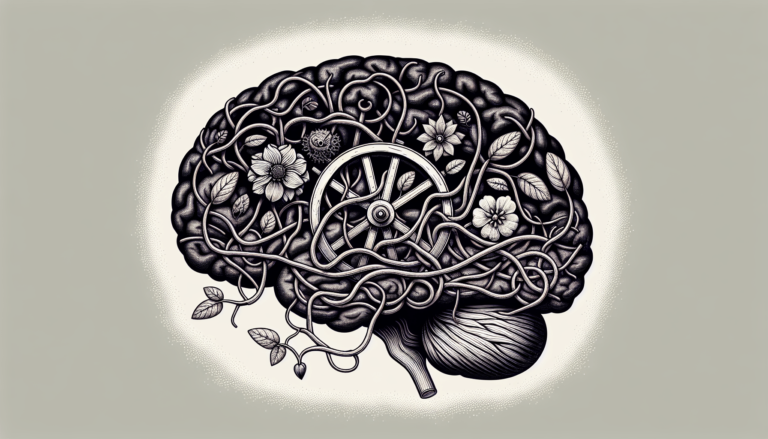The Benefits Of Keeping A Gratitude Journal
Imagine starting each day by reflecting on the things you are grateful for – the people, experiences, and little moments that bring you joy. Keeping a gratitude journal allows you to do just that, providing a space for you to acknowledge and appreciate the positive aspects of your life. Not only does this practice cultivate a sense of gratitude, but it has been shown to have numerous benefits for your overall well-being. From improving your mental health to enhancing your relationships, the simple act of recording your blessings can have a profound impact on your daily life. So grab a pen and a notebook, and let’s explore the incredible benefits of keeping a gratitude journal together.
Increase in Happiness and Well-being
1.1 Boosts Positive Emotions
Keeping a gratitude journal has been proven to boost positive emotions in individuals. By regularly reflecting on what you are grateful for, you train your brain to focus on the positive aspects of your life. This shift in perspective can lead to a significant increase in happiness and overall well-being. When you consciously acknowledge and appreciate the good things in your life, you start to notice even the smallest moments of joy and find greater satisfaction in your daily experiences.
1.2 Enhances Overall Life Satisfaction
Practicing gratitude through journaling can have a profound impact on your overall life satisfaction. By actively recognizing and expressing gratitude for the positive aspects of your life, you cultivate a sense of contentment and fulfillment. Studies have shown that individuals who regularly engage in gratitude journaling experience higher levels of life satisfaction compared to those who do not. The act of writing down your blessings and reflecting on them helps you to focus on what truly matters and increases your overall enjoyment of life.
1.3 Reduces Stress and Anxiety
One of the remarkable benefits of keeping a gratitude journal is its ability to reduce stress and anxiety. The practice of focusing on what you are grateful for helps shift your mindset away from worry and negative thoughts. By acknowledging the good things in your life, you bring a sense of calm and tranquility to your mind. Research has shown that gratitude journaling can decrease symptoms of stress and anxiety, providing a valuable tool for managing and coping with daily challenges.
Improved Physical Health
2.1 Strengthens Immune System
Engaging in gratitude journaling not only benefits your mental well-being but also has a positive impact on your physical health. Studies have indicated that expressing gratitude can strengthen your immune system. When you focus on the positive aspects of your life and express gratitude for them, the levels of stress hormones in your body decrease, allowing your immune system to function more effectively. This can result in a reduced risk of illnesses and a stronger overall physical well-being.
2.2 Promotes Better Sleep
Keeping a gratitude journal has been found to promote better sleep quality. When you take the time to reflect on the positive events and experiences of your day, you create a sense of peace and relaxation in your mind. This positive mindset can help alleviate racing thoughts and worry, making it easier to fall asleep and stay asleep throughout the night. By cultivating a habit of gratitude journaling before bedtime, you can improve the quality of your sleep and wake up feeling refreshed and rejuvenated.
2.3 Reduces Symptoms of Illnesses
Studies have shown that gratitude journaling can have a positive impact on reducing symptoms of certain illnesses. Chronic conditions such as pain, heart disease, and fibromyalgia have been shown to be positively affected by the practice of gratitude. By redirecting your focus towards the things you are grateful for, you can experience a reduction in the severity of physical symptoms. The act of gratitude journaling can help individuals manage their illnesses more effectively and improve their overall quality of life.

Enhanced Mental Health
3.1 Decreases Symptoms of Depression
Gratitude journaling has been found to be a powerful tool in decreasing symptoms of depression. Research has shown that individuals who regularly practice gratitude have lower levels of depressive symptoms compared to those who do not engage in gratitude exercises. Expressing gratitude through journaling helps shift your focus from negative thoughts and emotions to positive aspects of your life. This change in mindset can significantly impact your mood and contribute to a reduction in depressive symptoms.
3.2 Improves Mental Resilience
Regularly engaging in gratitude journaling has been shown to improve mental resilience. When faced with challenging situations or setbacks, individuals who practice gratitude can better cope and recover from adversity. By cultivating a mindset of gratitude, you develop the ability to find positive aspects even in difficult circumstances. This mental resilience allows you to bounce back quicker and maintain a more positive outlook on life.
3.3 Increases Self-Esteem
Gratitude journaling can also have a positive impact on self-esteem. By focusing on what you are grateful for, you naturally shift your attention away from negative self-talk and self-criticism. Instead, you develop a habit of acknowledging your strengths and the positive qualities you possess. This practice contributes to an increase in self-esteem and self-worth. As you consistently express gratitude for yourself and your accomplishments, you begin to recognize your value and embrace a more positive self-image.
Better Relationships and Social Connections
4.1 Increases Empathy and Compassion
Maintaining a gratitude journal can significantly increase your empathy and compassion towards others. The act of reflecting on the positive aspects of your life and expressing gratitude fosters a mindset of appreciation and understanding. As gratitude becomes a regular part of your life, you become more attuned to the kindness and support you receive from others. This heightened awareness allows you to cultivate empathy and compassion for those around you, resulting in stronger and more meaningful relationships.
4.2 Improves Relationships and Marriages
Practicing gratitude through journaling can have a transformative effect on your relationships, particularly in marriages or partnerships. When you express gratitude towards your partner and acknowledge their positive qualities, it strengthens the bond between you. Gratitude journaling promotes a deeper sense of connection and intimacy, as it encourages you to focus on what you appreciate about each other. By consistently expressing gratitude within your relationship, you create an environment of love and appreciation, leading to long-lasting and fulfilling partnerships.
4.3 Expands Social Support Network
Engaging in gratitude journaling can also lead to an expansion of your social support network. As you express gratitude towards others, you deepen your connections with friends, family, and colleagues. Gratitude has been found to promote prosocial behavior, making individuals more likely to engage in acts of kindness and build stronger social relationships. By embracing gratitude in your life, you attract positivity and create a supportive network of individuals who enrich your life and offer assistance when needed.

Increased Gratitude and Appreciation
5.1 Develops a Grateful Mindset
A gratitude journal serves as a tool for developing a grateful mindset. By regularly engaging in gratitude exercises, such as writing down what you are grateful for, you train your brain to recognize and appreciate the positive aspects of your life. This shift in mindset allows you to approach each day with an attitude of gratitude, increasing your overall sense of happiness and fulfillment. The more you practice gratitude journaling, the more natural and effortless it becomes to find beauty and gratitude in even the smallest moments.
5.2 Recognizes and Appreciates the Little Things
Keeping a gratitude journal helps you recognize and appreciate the little things that often go unnoticed in your daily life. By intentionally focusing on the small moments of joy and the blessings that surround you, you cultivate a sense of appreciation for the present moment. Through the practice of gratitude journaling, you become attuned to the beauty and goodness that can be found in everyday experiences. This heightened awareness leads to a greater sense of fulfillment and a deep appreciation for the richness of life.
5.3 Shifts Focus from Negativity to Positivity
The act of gratitude journaling can shift your focus from negativity to positivity. By consciously directing your attention towards what you are grateful for, you train your mind to seek out the positive aspects of your life instead of dwelling on the negative. This shift in focus has a transformative effect on your perspective, allowing you to approach challenges with resilience and optimism. As you consistently practice gratitude, positivity becomes your default mindset, leading to a happier and more fulfilling life.
Boost in Goal Attainment and Productivity
6.1 Heightens Motivation
Gratitude journaling has been shown to heighten motivation and increase goal attainment. By regularly reflecting on what you are grateful for, you cultivate a positive mindset that energizes and propels you towards achieving your goals. The practice of gratitude helps you to stay focused on the potential and opportunities that lie ahead, enhancing your motivation to take action. By incorporating gratitude journaling into your daily routine, you can harness this increased motivation and drive to accomplish your goals more effectively.
6.2 Facilitates Goal Clarity
When you keep a gratitude journal, you create space for goal clarity and self-reflection. By taking the time to reflect on what you are grateful for, you gain a deeper understanding of your values and desires. This self-reflection allows you to align your goals with your core values and identify what truly matters to you. By maintaining a gratitude journal, you gain clarity on your goals and objectives, making it easier to make choices and take actions that are in alignment with your aspirations.
6.3 Enhances Concentration and Focus
Practicing gratitude journaling can enhance your concentration and focus, ultimately leading to increased productivity. When you express gratitude for the present moment and the tasks at hand, you engage in a state of mindfulness. This focused awareness allows you to fully immerse yourself in each activity, leading to greater efficiency and effectiveness. By incorporating gratitude journaling into your daily routine, you can improve your ability to concentrate, stay present, and achieve a higher level of productivity.
Improved Emotional Intelligence
7.1 Cultivates Self-awareness
Keeping a gratitude journal can cultivate self-awareness, a crucial component of emotional intelligence. By regularly reflecting on what you are grateful for, you become more in tune with your emotions, thoughts, and reactions. This self-reflection allows you to develop a deep understanding of yourself, leading to greater emotional self-awareness. By acknowledging and expressing gratitude for your emotions and experiences, you can navigate them more effectively, ultimately improving your emotional intelligence.
7.2 Enhances Empathy towards Others
Practicing gratitude through journaling enhances your empathy towards others. When you express gratitude for the positive actions and qualities of others, you develop a deeper sense of understanding and compassion. This empathy allows you to connect with others on a deeper level and perceive their experiences with greater sensitivity. By incorporating gratitude journaling into your life, you strengthen your ability to relate to and support those around you, fostering strong and meaningful relationships.
7.3 Increases Emotional Regulation
Gratitude journaling has been found to increase emotional regulation, a key aspect of emotional intelligence. By consciously focusing on what you are grateful for, you cultivate a positive mindset that can help you manage your emotions more effectively. The act of expressing gratitude allows you to shift your perspective and regulate negative emotions. This increased emotional regulation contributes to greater emotional well-being and enhances your ability to navigate challenges with resilience and grace.
Strengthened Gratitude Practice
8.1 Sustains Consistency in Gratitude Practice
Keeping a gratitude journal helps sustain consistency in your gratitude practice. By dedicating specific time each day to express gratitude and write in your journal, you establish a routine that becomes a habit. Consistency is key when it comes to reaping the benefits of gratitude, and maintaining a journal ensures that you actively engage in the practice regularly. By incorporating gratitude journaling into your daily routine, you create a space for reflection and appreciation that becomes an integral part of your life.
8.2 Deepens Gratitude Experience
A gratitude journal allows you to deepen your gratitude experience. By writing down what you are grateful for, you create a tangible record of your blessings and experiences. This act of documenting your gratitude helps you to reflect on and revisit moments of joy and appreciation. By delving deeper into your gratitude experiences, you can uncover hidden blessings and gain a richer understanding of their impact on your life. By consistently using a gratitude journal, you can deepen your gratitude practice and cultivate a profound sense of appreciation.
8.3 Cultivates a Habit of Appreciation
The act of keeping a gratitude journal cultivates a habit of appreciation. By actively seeking out the positive aspects of your life and expressing gratitude for them, you train your mind to naturally focus on the good. As the habit of appreciation becomes ingrained in your daily routine, you develop a heightened awareness of the blessings that surround you. This habit of appreciation permeates all areas of your life, leading to a more positive and fulfilling existence. By incorporating gratitude journaling into your life, you actively cultivate a habit of appreciation that transforms your outlook and enhances your overall well-being.
Stress Coping Mechanism
9.1 Acts as a Stress Buffer
Gratitude journaling is a powerful stress coping mechanism. By focusing on what you are grateful for, you create a buffer against stress and its negative effects on your well-being. The act of expressing gratitude helps to shift your mindset away from worry and anxiety, allowing you to experience a sense of calm and relaxation. Research has shown that individuals who practice gratitude journaling have lower levels of stress compared to those who do not. By incorporating gratitude into your life, you develop a valuable tool to cope with and overcome stress.
9.2 Facilitates Emotional Release
Keeping a gratitude journal facilitates emotional release and provides an outlet for your emotions. The act of expressing gratitude allows you to process and release negative emotions, transforming them into positive energy. By acknowledging and appreciating the positive aspects of your life, you create space for healing and emotional growth. Gratitude journaling provides a safe and supportive space to express your emotions authentically, leading to a sense of relief and emotional well-being.
9.3 Encourages Positive Coping Strategies
Practicing gratitude through journaling encourages the development of positive coping strategies. When faced with challenges or stressful situations, individuals who practice gratitude are more likely to approach difficulties with resilience and a positive mindset. By cultivating a habit of gratitude, you train your brain to seek out solutions, focus on the good, and find meaning in adversity. Gratitude journaling provides a powerful tool to cope with life’s ups and downs, allowing you to maintain a positive perspective and navigate challenges with grace.
Improved Self-reflection and Personal Growth
10.1 Enhances Self-reflection Skills
Keeping a gratitude journal enhances your self-reflection skills. By regularly taking the time to reflect on what you are grateful for, you develop a deeper understanding of yourself and your experiences. This intentional self-reflection fosters personal growth and allows you to gain valuable insights into your values, aspirations, and areas for improvement. By incorporating gratitude journaling into your routine, you create a space for self-reflection that facilitates personal growth and self-awareness.
10.2 Facilitates Emotional and Personal Growth
Practicing gratitude through journaling facilitates both emotional and personal growth. By expressing gratitude for your experiences, challenges, and achievements, you develop a growth mindset that allows you to embrace change and learn from your experiences. Gratitude journaling helps you appreciate the lessons learned from difficult situations and view them as opportunities for growth. By actively engaging in this practice, you foster emotional resilience and personal evolution.
10.3 Promotes Mindfulness
A gratitude journal promotes mindfulness, allowing you to be fully present in each moment. By focusing on what you are grateful for, you anchor yourself in the present and cultivate a deep sense of awareness. This mindfulness practice enhances your ability to savor the richness of life and find joy in the simplest of moments. By incorporating gratitude journaling into your daily routine, you develop a mindful approach to life, allowing you to fully experience and appreciate each moment.
In conclusion, keeping a gratitude journal offers numerous benefits that positively impact various aspects of your life. From increasing happiness and well-being to improving physical and mental health, gratitude journaling has a transformative effect on your overall quality of life. It strengthens relationships, enhances goal attainment and productivity, improves emotional intelligence, and fosters personal growth. By integrating gratitude journaling into your daily routine, you can cultivate a mindset of appreciation and unlock the myriad of benefits that come with it. So grab your journal and start experiencing the incredible power of gratitude today!







